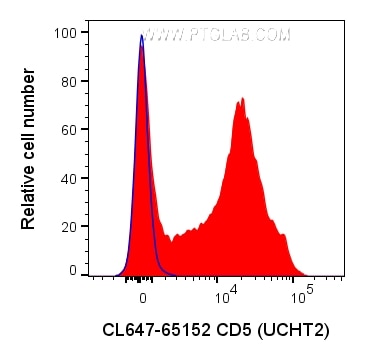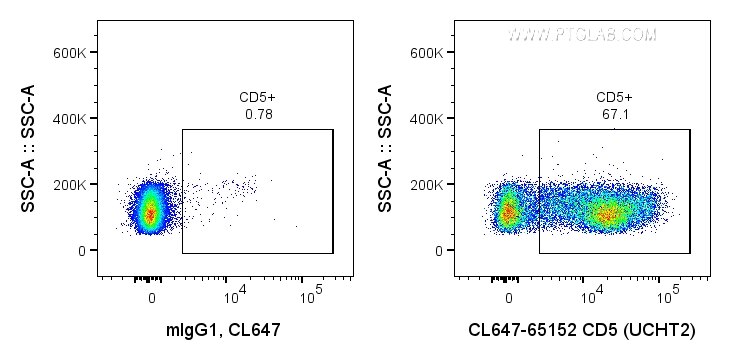Validation Data Gallery
Tested Applications
| Positive FC detected in | human PBMCs |
Recommended dilution
| Application | Dilution |
|---|---|
| Flow Cytometry (FC) | FC : 5 ul per 10^6 cells in 100 μl suspension |
| This reagent has been pre-titrated and tested for flow cytometric analysis. The suggested use of this reagent is 5 µl per 10^6 cells in a 100 µl suspension or 5 µl per 100 µl of whole blood. | |
| Sample-dependent, Check data in validation data gallery. | |
Product Information
CL647-65152 targets CD5 in FC applications and shows reactivity with human samples.
| Tested Reactivity | human |
| Host / Isotype | Mouse / IgG1, kappa |
| Class | Monoclonal |
| Type | Antibody |
| Immunogen |
N/A 相同性解析による交差性が予測される生物種 |
| Full Name | CD5 molecule |
| Calculated molecular weight | 495 aa, 55 kDa |
| GenBank accession number | BC027901 |
| Gene Symbol | CD5 |
| Gene ID (NCBI) | 921 |
| ENSEMBL Gene ID | ENSG00000110448 |
| RRID | AB_2883716 |
| Conjugate | CoraLite® Plus 647 Fluorescent Dye |
| Excitation/Emission maxima wavelengths | 654 nm / 674 nm |
| Form | |
| Form | Liquid |
| Purification Method | Affinity purification |
| UNIPROT ID | P06127 |
| Storage Buffer | PBS with 0.09% sodium azide and 0.5% BSA{{ptg:BufferTemp}}7.3 |
| Storage Conditions | Store at 2-8°C. Avoid exposure to light. Stable for one year after shipment. |
Background Information
CD5 is a type I transmembrane glycoprotein of the scavenger receptor cysteine-rich family (PMID: 12403363). CD5 is expressed on a majority of thymocytes, mature T cells, B cell subsets, and peripheral blood dendritic cells (PMID: 9858516; 6156984; 10379049; 1384337). CD5 may act as a receptor in regulating T-cell proliferation. It functions as a negative regulator of TCR signaling during thymocyte development (PMID: 7542801).
Protocols
| Product Specific Protocols | |
|---|---|
| FC protocol for CL Plus 647 CD5 antibody CL647-65152 | Download protocol |
| Standard Protocols | |
|---|---|
| Click here to view our Standard Protocols |


